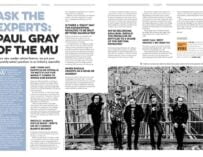
Is stream-ripping threatening the long-term health of the music industry? Image by GovernmentZA/Creative Commons.
Stream-ripping sites threaten to reverse the positive impact that streaming services have had combating music piracy and increasing industry revenue
In April, Songwriting reported on the increase in royalties being paid to songwriters, composers and music publishers during 2016. The figures indicated that music fans were paying to consume music and abandoning illegal download sites like The Pirate Bay.
The change in attitude was linked to streaming services such as Apple Music, and the surge in vinyl sales. But new ways of ripping music are threatening the U-turn, specifically stream-ripping.
Stream-ripping is defined by Terrica Carrington, of the Copyright Alliance, as: “a process by which everyday listeners can “rip” a file from a streaming platform and convert it into a downloadable file.”
Stream-ripping is becoming the fastest-growing form of music piracy in the UK. New research from the Intellectual Property Rights and PRS For Music shows that 15% of adults use these services, with 33% of them coming from the 16-24 age bracket.
When surveyed, people gave the following reasons for stream-ripping: music was already owned by the user in another format (31% of users), wanting to listen to music offline (26%), wanting to listen to music on the move (25%), cannot afford to pay for music (21%), the feeling that official music content is overpriced (20%) – these figures add up to more than 100%, as people could choose more than one response.
The price of purchasing music often puts off consumers. So, to combat the issue of cost, streaming sites introduced a monthly subscription fee, allowing users access to unlimited music. But even this hasn’t quelled music piracy, with Pippa Hall, Chief Economist at the IPO, explaining: “as soon as we think we’ve come up with an innovative solution [to piracy], the pirates seem to come up with an even more innovative infringement tactic.”
The use of stream-ripping sites increased 141.3% between 2014 and 2016. This is countered somewhat by an increase in revenue and royalties, with a rise in average consumer spending on music (up from £68 in 2016 to £75 this year) contributing to this.
The important point, though, is that any loss of revenue can have a damaging effect on the well-being of the music industry and, as PRS for Music’s Robert Ashcroft explains: “the long-term health of the UK’s cultural and creative sectors is in everyone’s best interests, including those of the digital service providers.”


































I grew up on vinyl and then CD’s. I bought a few cassette taps, never bothered with 8 tracks. I was happy buying my music and still enjoy all those albums I bought decades ago. Streaming to me detracts from the artist, it’s rent a music at its finest. Listen to what you want as long as you pay a fee. The quality is less, the experience is more convenient but lacks any personal connection to artist. No CD covers, album inserts, pictures and bio’s. All were left with is sound, and a bill each month. I guess we’re in a generation which likes no commitment, no purchases, just rent stuff. How many actually listen to a whole album anymore? The music I like is worthy of owning,and the stuff that isn’t. I don’t even want to rent it. That’s how you get good music. Make it worthwhile for the artist to produce good stuff.
I allowed myself to be persuaded to buy Apple Music. My choice. Suddenly I’m like a kid in sweet shop – I have the biggest juke box in the world at my fingertips and as a result listen to less than I used to. Music seems less special now. Anyone else feel the same way?